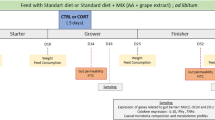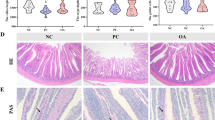Abstract
Stress has been recognized as a critical risk factor for gastrointestinal diseases in both humans and animals. However, nutritional strategies to attenuate stress-induced intestinal barrier function and underlying mechanisms remain largely unknown. This study tested the hypothesis that l-tryptophan enhanced intestinal barrier function by regulating mucosal serotonin metabolism in chronic unpredictable stress-exposed broilers. One-day-old male broilers (Arbor Acres) were fed a basal diet supplemented with or without l-tryptophan in the absence or presence of chronic unpredictable stress. Feed intake, body weight gain, plasma corticosterone and 5-hydroxytryptamine (5-HT), intestinal permeability, mucosal secretory IgA (sIgA), and mRNA levels for tryptophan hydroxylase 1 (TPH1), IL-1β, IL-6, TNF-α, IL-10, protein abundance for claudin-1, occludin, and ZO-1 were determined. Stress exposure led to elevated plasma corticosterone (P < 0.05), increased intestinal permeability (P < 0.05), reduced growth performance (P < 0.05), and decreased sIgA secretion compared with the controls. These effects were largely reversed (P < 0.05) by l-tryptophan supplementation. Western blot analysis showed that stress exposure resulted in decreased protein abundance for occludin, claudin-1, and ZO-1, which was attenuated by l-tryptophan. mRNA levels for IL-1β, IL-6, and TNF-α were increased, but those for IL-10 were decreased, in the jejunal tissue of broilers subjected to stress. This effect of stress on cytokine expression was abolished by l-tryptophan treatment. The effects of stress were associated with decreased plasma concentration of 5-HT (P < 0.05), and reduced (P < 0.05) mRNA levels for TPH1. l-Tryptophan supplementation markedly attenuated stress-induced alterations in 5-HT and TPH1 mRNA level in jejunal tissues of broilers. Collectively, these results indicate that l-tryptophan supplementation alleviates chronic unpredictable stress-induced intestinal barrier dysfunction by regulating 5-HT metabolism in broilers.





Similar content being viewed by others
References
Al-Sadi R, Guo S, Dokladny K, Smith MA, Ye D, Kaza A, Watterson DM, Ma TY (2012) Mechanism of interleukin-1beta induced-increase in mouse intestinal permeability in vivo. J Interferon Cytokine Res 32:474–484
Al-Sadi R, Guo S, Ye D, Dokladny K, Alhmoud T, Ereifej L, Said HM, Ma TY (2013) Mechanism of IL-1beta modulation of intestinal epithelial barrier involves p38 kinase and activating transcription factor-2 activation. J Immunol 190:6596–6606
Bartosz B, Agnieszka M-B, Robert P, Slawomir K, Jan B, Malgorzata Z-W, Tomasz M, Tomasz B (2016) Mechanisms by which stress affects the experimental and clinical inflammatory bowel disease (IBD). Role of brain-gut axis. Curr Neuropharmacol 14:1–9
Bhatia V, Tandon RK (2005) Stress and the gastrointestinal tract. J Gastroenterol Hepatol 20:332–339
Burkholder KM, Thompson KL, Einstein ME, Applegate TJ, Patterson JA (2008) Influence of stressors on normal intestinal microbiota, intestinal morphology, and susceptibility to Salmonella enteritidis colonization in broilers. Poult Sci 87:1734–1741
Camilleri M (2009) Serotonin in the gastrointestinal tract. Curr Opin Endocrinol Diabetes Obes 16:53–59
Campos AC, Fogaca MV, Aguiar DC, Guimaraes FS (2013) Animal models of anxiety disorders and stress. Rev Bras Psiquiatr 35(Suppl 2):S101–S111
Campos-Rodriguez R, Godinez-Victoria M, Abarca-Rojano E, Pacheco-Yepez J, Reyna-Garfias H, Barbosa-Cabrera RE, Drago-Serrano ME (2013) Stress modulates intestinal secretory immunoglobulin A. Front Integr Neurosci 7:86
Coates MD, Mahoney CR, Linden DR, Sampson JE, Chen J, Blaszyk H, Crowell MD, Sharkey KA, Gershon MD, Mawe GM, Moses PL (2004) Molecular defects in mucosal serotonin content and decreased serotonin reuptake transporter in ulcerative colitis and irritable bowel syndrome. Gastroenterology 126:1657–1664
Cohen S, Miller GE, Rabin BS (2001) Psychological stress and antibody response to immunization: a critical review of the human literature. Psychosom Med 63:7–18
Corthesy B (2013) Multi-faceted functions of secretory IgA at mucosal surfaces. Front Immunol 4:185
De Santis S, Cavalcanti E, Mastronardi M, Jirillo E, Chieppa M (2015) Nutritional keys for intestinal barrier modulation. Front Immunol 6:612
Dizdar V, Spiller R, Singh G, Hanevik K, Gilja OH, El-Salhy M, Hausken T (2010) Relative importance of abnormalities of CCK and 5-HT (serotonin) in Giardia-induced post-infectious irritable bowel syndrome and functional dyspepsia. Aliment Pharmacol Ther 31:883–891
El-Lethey H, Huber-Eicher B, Jungi TW (2003) Exploration of stress-induced immunosuppression in chickens reveals both stress-resistant and stress-susceptible antigen responses. Vet Immunol Immunopathol 95:91–101
Garriga C, Hunter RR, Amat C, Planas JM, Mitchell MA, Moreto M (2006) Heat stress increases apical glucose transport in the chicken jejunum. Am J Physiol Regul Integr Comp Physiol 290:R195–R201
Haub S, Kanuri G, Volynets V, Brune T, Bischoff SC, Bergheim I (2010) Serotonin reuptake transporter (SERT) plays a critical role in the onset of fructose-induced hepatic steatosis in mice. Am J Physiol Gastrointest Liver Physiol 298:G335–G344
Hu CH, Xiao K, Luan ZS, Song J (2013) Early weaning increases intestinal permeability, alters expression of cytokine and tight junction proteins, and activates mitogen-activated protein kinases in pigs. J Anim Sci 91:1094–1101
Hyun Y, Ellis M, Riskowski G, Johnson RW (1998) Growth performance of pigs subjected to multiple concurrent environmental stressors. J Anim Sci 76:721–727
Kerckhoffs AP, Ter Linde JJ, Akkermans LM, Samsom M (2008) Trypsinogen IV, serotonin transporter transcript levels and serotonin content are increased in small intestine of irritable bowel syndrome patients. Neurogastroenterol Motil 20:900–907
Kerckhoffs AP, ter Linde JJ, Akkermans LM, Samsom M (2012) SERT and TPH-1 mRNA expression are reduced in irritable bowel syndrome patients regardless of visceral sensitivity state in large intestine. Am J Physiol Gastrointest Liver Physiol 302:G1053–G1060
Keszthelyi D, Troost FJ, Masclee AA (2009) Understanding the role of tryptophan and serotonin metabolism in gastrointestinal function. Neurogastroenterol Motil 21:1239–1249
Keszthelyi D, Troost FJ, Jonkers DM, van Eijk HM, Lindsey PJ, Dekker J, Buurman WA, Masclee AA (2014) Serotonergic reinforcement of intestinal barrier function is impaired in irritable bowel syndrome. Aliment Pharmacol Ther 40:392–402
Kim JJ, Bridle BW, Ghia J-E, Wang H, Syed SN, Manocha MM, Rengasamy P, Shajib MS, Wan Y, Hedlund PB, Khan WI (2013) Targeted inhibition of serotonin type 7 (5-HT7) receptor function modulates immune responses and reduces the severity of intestinal inflammation. J Immunol 190:4795–4804
Kuttappan VA, Berghman LR, Vicuna EA, Latorre JD, Menconi A, Wolchok JD, Wolfenden AD, Faulkner OB, Tellez GI, Hargis BM, Bielke LR (2015) Poultry enteric inflammation model with dextran sodium sulfate mediated chemical induction and feed restriction in broilers. Poult Sci 94:1220–1226
Lambert GP (2009) Stress-induced gastrointestinal barrier dysfunction and its inflammatory effects. J Anim Sci 87:E101–E108
Mantis NJ, Rol N, Corthesy B (2011) Secretory IgA’s complex roles in immunity and mucosal homeostasis in the gut. Mucosal Immunol 4:603–611
Markus CR, Olivier B, Panhuysen GEM, Van der Gugten J, Alles MS, Tuiten A, Westenberg HGM, Fekkes D, Kopeschaar HF, de Haan E (2000) The bovine protein alpha-lactalbumin increases the plasma ratio of tryptophan to the other large neutral amino acids, and in vulnerable subjects raises brain serotonin activity, reduces cortisol concentration, and improves mood under stress. Am J Clin Nutr 71:1536–1544
Martinez-Carrillo BE, Godinez-Victoria M, Jarillo-Luna A, Oros-Pantoja R, Abarca-Rojano E, Rivera-Aguilar V, Yepez JP, Sanchez-Torres LE, Campos-Rodriguez R (2011) Repeated restraint stress reduces the number of IgA-producing cells in Peyer’s patches. NeuroImmunoModulation 18:131–141
Nylander O, Pihl L (2006) Luminal hypotonicity increases duodenal mucosal permeability by a mechanism involving 5-hydroxytryptamine. Acta Physiol (Oxf) 186:45–58
O’Mahony SM, Clarke G, Borre YE, Dinan TG, Cryan JF (2015) Serotonin, tryptophan metabolism and the brain-gut-microbiome axis. Behav Brain Res 277:32–48
Overman EL, Rivier JE, Moeser AJ (2012) CRF induces intestinal epithelial barrier injury via the release of mast cell proteases and TNF-alpha. PLoS One 7:e39935
Pohl CS, Medland JE, Moeser AJ (2015) Early-life stress origins of gastrointestinal disease: animal models, intestinal pathophysiology, and translational implications. Am J Physiol Gastrointest Liver Physiol 309:G927–G941
Puglisi-Allegra S, Andolina D (2015) Serotonin and stress coping. Behav Brain Res 277:58–67
Puvadolpirod S, Thaxton JP (2000) Model of physiological stress in chickens 4. Digestion and metabolism. Poult Sci 79:383–390
Quinteiro-Filho WM, Ribeiro A, Ferraz-de-Paula V, Pinheiro ML, Sakai M, Sa LR, Ferreira AJ, Palermo-Neto J (2010) Heat stress impairs performance parameters, induces intestinal injury, and decreases macrophage activity in broiler chickens. Poult Sci 89:1905–1914
Quinteiro-Filho WM, Rodrigues MV, Ribeiro A, Ferraz-de-Paula V, Pinheiro ML, Sa LR, Ferreira AJ, Palermo-Neto J (2012) Acute heat stress impairs performance parameters and induces mild intestinal enteritis in broiler chickens: role of acute hypothalamic-pituitary-adrenal axis activation. J Anim Sci 90:1986–1994
Soderholm JD, Yang PC, Ceponis P, Vohra A, Riddell R, Sherman PM, Perdue MH (2002) Chronic stress induces mast cell-dependent bacterial adherence and initiates mucosal inflammation in rat intestine. Gastroenterology 123:1099–1108
Song J, Xiao K, Ke YL, Jiao LF, Hu CH, Diao QY, Shi B, Zou XT (2014) Effect of a probiotic mixture on intestinal microflora, morphology, and barrier integrity of broilers subjected to heat stress. Poult Sci 93:581–588
Spiller R (2008) Serotonin and GI clinical disorders. Neuropharmacology 55:1072–1080
Sutanto W, de Kloet ER (1994) The use of various animal models in the study of stress and stress-related phenomena. Lab Anim 28:293–306
Ulrich-Lai YM, Herman JP (2009) Neural regulation of endocrine and autonomic stress responses. Nat Rev Neurosci 10:397–409
Varasteh S, Braber S, Akbari P, Garssen J, Fink-Gremmels J (2015) Differences in susceptibility to heat stress along the chicken intestine and the protective effects of galacto-oligosaccharides. PLoS One 10:e0138975
Vicuna EA, Kuttappan VA, Galarza-Seeber R, Latorre JD, Faulkner OB, Hargis BM, Tellez G, Bielke LR (2015) Effect of dexamethasone in feed on intestinal permeability, differential white blood cell counts, and immune organs in broiler chicks. Poult Sci 94:2075–2080
Wang SH, Dong L, Luo JY, Gong J, Li L, Lu XL, Han SP (2007) Decreased expression of serotonin in the jejunum and increased numbers of mast cells in the terminal ileum in patients with irritable bowel syndrome. World J Gastroenterol 13:6041–6047
Wang B, Min Z, Yuan J, Zhang B, Guo Y (2014) Effects of dietary tryptophan and stocking density on the performance, meat quality, and metabolic status of broilers. J Anim Sci Biotechnol 5:44
Wang B, Wu G, Zhou Z, Dai Z, Sun Y, Ji Y, Li W, Wang W, Liu C, Han F, Wu Z (2015a) Glutamine and intestinal barrier function. Amino Acids 47:2143–2154
Wang H, Ji Y, Wu G, Sun K, Sun Y, Li W, Wang B, He B, Zhang Q, Dai Z, Wu Z (2015b) l-Tryptophan activates mammalian target of rapamycin and enhances expression of tight junction proteins in intestinal porcine epithelial cells. The Journal of nutrition 145:1156–1162
Wilhelmsen I (2000) The role of psychosocial factors in gastrointestinal disorders. Gut 47:73–75
Wu G (2016) Dietary protein intake and human health. Food Funct 7:1251–1265
Wu W, Sun MM, Zhang HP, Chen TF, Wu RJ, Liu CQ, Yang G, Geng XR, Feng BS, Liu ZG, Liu ZJ, Yang PC (2014) Prolactin mediates psychological stress-induced dysfunction of regulatory T cells to facilitate intestinal inflammation. Gut 63:1883–1892
Yahav S (2000) Domestic fowl—strategies to confront environmental conditions. Avian Poult Biol Rev 11:81–95
Zareie M, Johnson-Henry K, Jury J, Yang PC, Ngan BY, McKay DM, Soderholm JD, Perdue MH, Sherman PM (2006) Probiotics prevent bacterial translocation and improve intestinal barrier function in rats following chronic psychological stress. Gut 55:1553–1560
Acknowledgements
We thank Dr Guoyao Wu for helpful discussion and suggestion on the manuscript. This work was partly supported by the National Natural Science Foundation of China (No. 31572423, 31372327).
Author information
Authors and Affiliations
Corresponding author
Ethics declarations
Conflict of interest
The authors declare that they have no conflict of interest.
Ethical statement
The use of animals for this research was approved by the Institutional Animal Care and Use Committee of China Agricultural University.
Rights and permissions
About this article
Cite this article
Yue, Y., Guo, Y. & Yang, Y. Effects of dietary l-tryptophan supplementation on intestinal response to chronic unpredictable stress in broilers. Amino Acids 49, 1227–1236 (2017). https://doi.org/10.1007/s00726-017-2424-3
Received:
Accepted:
Published:
Issue Date:
DOI: https://doi.org/10.1007/s00726-017-2424-3




